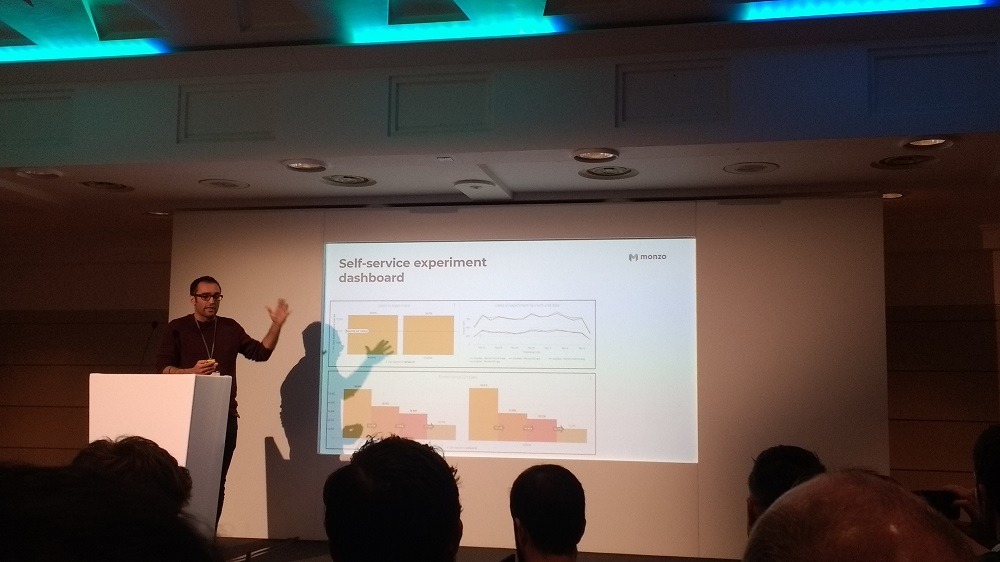Monzo: how the bank of the future uses AI

Credit: WanderlustChloe.com
Monzo is changing perceptions of financial institutions, one pink card at a time. We speak to their machine learning lead on how AI is transforming banking.
When Apple launched the catchphrase “There’s an app for that”, perhaps not even they could predict the industries that would be turned on their head by smartphone technology.
Uber has revolutionised the way we think about taxis, to the point where apps for takeaway like Deliveroo, or Slack for communication, have been referred to as “The Uber of…” another specific industry. However, perhaps the biggest success story in recent years of app-based businesses is Monzo, a digital-only bank famous for its coral-pink cards.
Monzo stands out from the crowd and not just for its card shade. It’s a given that major financial institutions should offer their services online these days; that high street banks should come with an app for checking your balance. Monzo takes that a step further, leading the charge on so many banking features that are being copied by others. Auto-budgeting was a big favourite when the app launched; since then, the option to round up your change and leave it in a savings pot has become increasingly popular too.
Finance is changing and innovation runs through the heart of Monzo. The company has caught the imagination mainly from Millenials because of its willingness to do things differently. Monzo uses machine learning to improve its service and understand its customers a little more.
It’s perhaps an unlikely success story: a bank that has become fashionable, completely without branches. “I’ve chatted with data scientists across the industry who are in some of the older banks,” says Neal Lathia, Machine Learning Lead at Monzo. “To a certain extent, all of them are looking into AI.”
What makes Monzo different?
“I was first introduced to machine learning when I started a PhD at University College London and became interested in how recommender systems work,” says Neal. “At the time, I was using tools like Last.fm to discover music and Netflix had just announced a million-dollar competition to improve their recommendations. From there, my career has always focused on machine learning and data science.”
Neal did years of post-doctoral research. From there he was involved with a health tech start-up before consulting for a few companies and joining Skyscanner. He was introduced to Monzo as a customer by his sister, who signed up in what he calls, “The old pre-paid card days,” before the company had a full banking license.
The technology itself has matured so much in the last few years that AI is now where mobile apps were a decade or so ago: sort of new, but emerging quickly.
Neal Lathia, Machine Learning Lead, Monzo
“That old version of Monzo didn’t have savings pots, loans, shared tabs, or many of the other brilliant features that make Monzo unique today,” he says. “But I was excited by the potential of what it could become, and specifically excited by the prospect of being able to build tools that leverage rich financial datasets to help make money work for millions of people.”
Neal joined Monzo in February 2018 as a Senior Data Scientist at the business. “I don’t count myself as an expert in all of the new banks that are out there today,” he admits. “Most of them are saying similar things – like putting customers first and being transparent. Someone who joined Monzo recently and was speaking about this at a company-wide meeting made a comment about this that rang true for me: Monzo isn’t just speaking publicly about these values, but also living by them.”
Machine learning is at the core of these values. Neal says that the company are considering “stepping outside” of the applications associated with traditional banking. One idea blogged about recently is trending spending, a feature which would allow customers to discover places in their location based on financial transactions. Such data would presumably require AI to implement.
“We are going to work on building up the foundation for machine learning in the core areas of Monzo,” Neal says, “like we are doing with customer service right now.”
Monzo has already introduced AI to customer service
“We have a very small team of machine learning scientists at Monzo: there are four of us total,” says Neal. “Right now, our major focus is on customer service.”
With customer service being a key area of concern for so many banks, Monzo is taking a different approach. There are two complementary sides to how they use machine learning in this domain.
“First, we partner with product teams to improve the help sections of the app: for example, we run the systems that allow customers to search our help articles,” Neal explains.

“When customers go to the chat screen and get in touch with our customer support, we turn towards the second side: building tools to help our customer support agents to help customers faster. For example, we have a system that recommends to agents how they can respond to different customer queries.
Neal believes that this technology will become the norm in the coming years. Whilst many banks are looking into how to implement AI, very few are already using it to benefit their customers.
“The technology itself has matured so much in the last few years that AI is now where mobile apps were a decade or so ago: sort of new, but emerging quickly,” Neal adds.
What does the future hold for Monzo?
“Shortly after I joined Monzo about 18 months ago, we celebrated a fun milestone: we had just surpassed half a million customers,” says Neal. “We now have more than 2.5 million UK customers and are launching in the US while continuing to release new products – like loans – here in the UK.”
The sharp rise is not predicted to slow any time soon. Over a year ago now, the company documented how it planned to accumulate a billion customers: that’s a lot of customer service, for a start.
Artificial intelligence will no doubt continue to be central for Monzo in learning about their customers and expanding accordingly.
“I see machine learning as one of the many tools that we will use to help customers discover, understand and make decisions about their financial lives.”
